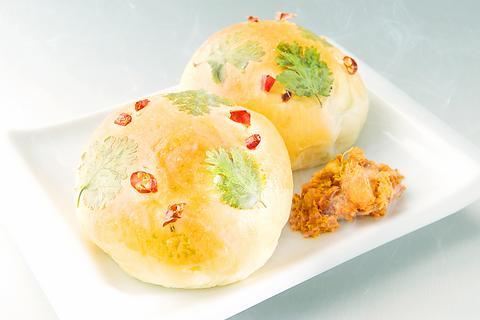There have been a flood of imports from Singapore recently, not least the Page One book store and Jason's supermarket, which are purportedly taking Taipei to new levels of consumer sophistication. On a smaller scale, there is now BreadTalk, which opened in Taipei two weeks ago in a newly refurbished building off Renai Road that goes by the name "Departures."
The BreadTalk has an air of simplicity and elegance. From the street, one can look through the spacious white interior into the well-ordered kitchen out back. Inside, the place reeks of concept rather than being perfumed by freshly baked bread. Lets say it's all a tad antiseptic.
According to Tiffany Wang (

PHOTO COURTESY OF BREAD TALK
The Happy Hiam, a soft bread horseshoe filled with spicy shrimp, or the tomyam pao, which has a Thai-style sweet-and-sour paste filling that carries a real kick are there to tempt the truly adventurous, and in their own terms are remarkably successful creations. At a less terrifying level of creativity, there is the sweet potato and cinnamon role or the chillied whitebait triangle flavored with pandan leaf, which offers considerable gastronomic titillation. If this array of Southeast Asian flavors all seems a bit too much, the curried naan or the moshi mushroom (a chicken and mushroom pie in a sweet puff pastry) are more conventional. There are also many other breads that will be familiar to anyone who has visited a local bakery.
For those who see bread in exclusively European terms, it must be noted that BreadTalk also offers a really quite outstanding baguette that has not, at least yet, succumbed to the local preference of a soft, pasty and sweet character.
While the bread and sweet bun lineup has been pretty much established, its offering of cakes is still undergoing revision, but currently does not have anything that cannot be obtained from any of the major bakery chains. There are also plans to offer sandwiches at a later stage.
While the arrival of BreadTalk will not be a revelation in the Taipei bakery scene, its unique Southeast Asian flavors are a welcome addition to what is currently on offer.

June 9 to June 15 A photo of two men riding trendy high-wheel Penny-Farthing bicycles past a Qing Dynasty gate aptly captures the essence of Taipei in 1897 — a newly colonized city on the cusp of great change. The Japanese began making significant modifications to the cityscape in 1899, tearing down Qing-era structures, widening boulevards and installing Western-style infrastructure and buildings. The photographer, Minosuke Imamura, only spent a year in Taiwan as a cartographer for the governor-general’s office, but he left behind a treasure trove of 130 images showing life at the onset of Japanese rule, spanning July 1897 to

In an interview posted online by United Daily News (UDN) on May 26, current Chinese Nationalist Party (KMT) Chairman Eric Chu (朱立倫) was asked about Taichung Mayor Lu Shiow-yen (盧秀燕) replacing him as party chair. Though not yet officially running, by the customs of Taiwan politics, Lu has been signalling she is both running for party chair and to be the party’s 2028 presidential candidate. She told an international media outlet that she was considering a run. She also gave a speech in Keelung on national priorities and foreign affairs. For details, see the May 23 edition of this column,

One of the most important gripes that Taiwanese have about the Democratic Progressive Party (DPP) is that it has failed to deliver concretely on higher wages, housing prices and other bread-and-butter issues. The parallel complaint is that the DPP cares only about glamor issues, such as removing markers of Chinese Nationalist Party (KMT) colonialism by renaming them, or what the KMT codes as “de-Sinification.” Once again, as a critical election looms, the DPP is presenting evidence for that charge. The KMT was quick to jump on the recent proposal of the Ministry of the Interior (MOI) to rename roads that symbolize

Jade Mountain (玉山) — Taiwan’s highest peak — is the ultimate goal for those attempting a through-hike of the Mountains to Sea National Greenway (山海圳國家綠道), and that’s precisely where we’re headed in this final installment of a quartet of articles covering the Greenway. Picking up the trail at the Tsou tribal villages of Dabang and Tefuye, it’s worth stocking up on provisions before setting off, since — aside from the scant offerings available on the mountain’s Dongpu Lodge (東埔山莊) and Paiyun Lodge’s (排雲山莊) meal service — there’s nowhere to get food from here on out. TEFUYE HISTORIC TRAIL The journey recommences with